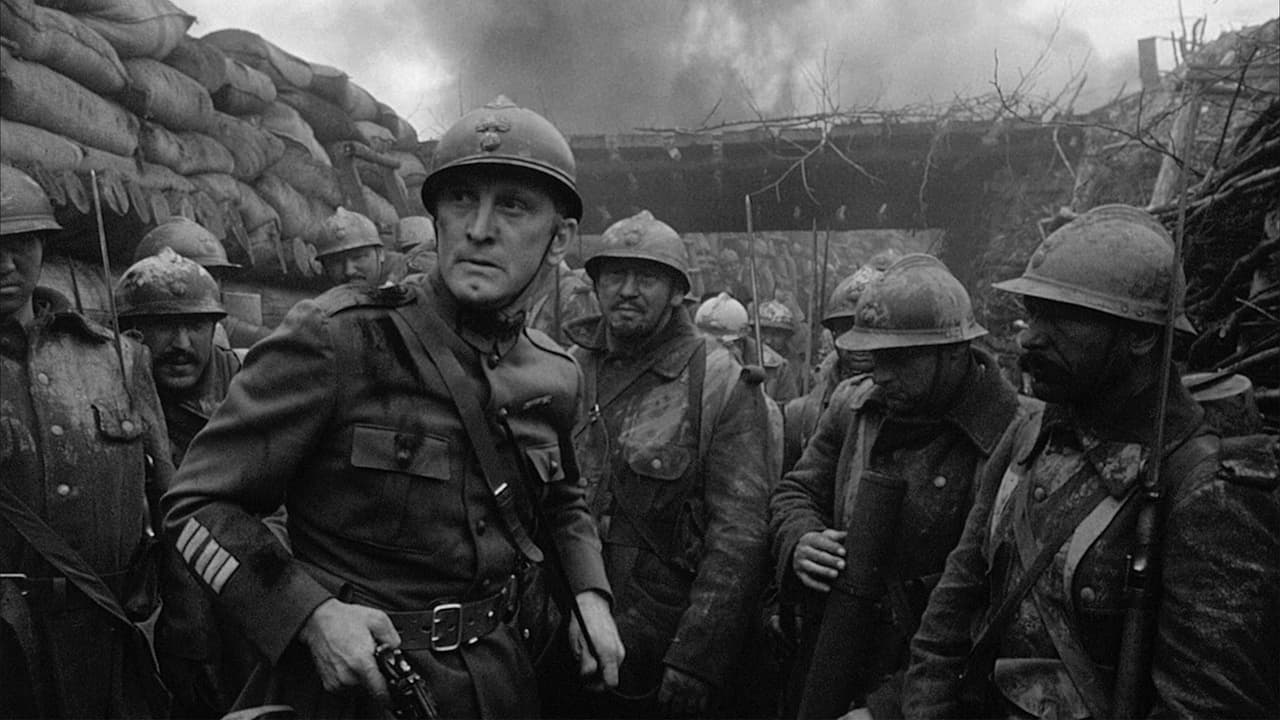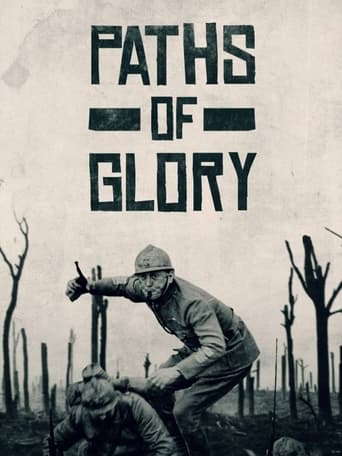



the leading man is my tpye
Wonderfully offbeat film!
The biggest problem with this movie is it’s a little better than you think it might be, which somehow makes it worse. As in, it takes itself a bit too seriously, which makes most of the movie feel kind of dull.
View MoreI think this is a new genre that they're all sort of working their way through it and haven't got all the kinks worked out yet but it's a genre that works for me.
View MoreWhat could I possibly add to the culture or knowledge of this film? To me, on certain days, this is Kubrick's finest achievement. Without a doubt this is the most impactful anti-war film ever produced. Kubrick i employs an unwaveringly documentarian approach in recounting this fictionalized amalgam of what could have been any battle on the Western Front. Portraying the ruthless mundanity and senseless destruction of human life in those trenches is done so effectively that he's succeeded in making such an abhorrent level of violence seem routine. You accept it as a norm. Something that we should never let it become. But we have , we have to in order to devote full and complete attention to the mental insanity that is unfolding in the upper ranks of France's military-industrial complex. A Dance of Death is unfolding over the failure of yet another Offensive. Heads must roll. Three enlisted men are essentially randomly selected for summary execution before a Firing Squad. During the battle and desperate to make good on his predictions for a glorious French victory over the hated Huns, an order is issued to the French artillery gunners .Confused, the targeting Corporal requests confirmation of the coordinates. Surely this must be an error. These numbers would put all of our largest shells right on top of our own French positions!! Timothy Carey plays one of the three enlisted men. Pvt. Maurice Ferol. The man was born to play this role. Carey's delivery is the most devastating Supporting Actor performance I've ever witnessed on the big screen. I'm neither kidding you nor am I exaggerating. Tell me if I'm wrong, go ahead and tell me.
View MoreStanley Kubrick is releasing a film denouncing an injustice during the First World War, two French generals send their troops in a suicide mission to take a point to the Germans, faced with the impossibility of advancing before the enemy bullets, French soldiers don't advance. This film shows the devotion of a simple colonel, Colonel Dax interpreted by Mister Kirk Douglas himself, trying to defend French soldiers who listened to their instincts of survival against French seniors officers thinking only of their careers, Kubrick shows the human (and maybe the French, who knows?) stupidity to want to make examples where those who should be killed are those who send their troops to die without any mercy and not those who are sent as cows to the slaughterhouse. The film is animated by special effects of time, but neither the latter nor the black and white are disturbing, on the contrary, it brings authenticity to this masterpiece of Stanley Kubrick who deserves his 9/10, almost a 10 ! Glory to M. Kubrick for this masterpiece!
View MoreOne of the best war movies ever, and especially of WW1. Kirk Douglas has an especially fine performance as Col. Dax, and George Macready is simply terrific as the merciless and incompetent general ordering the attack. Adolphe Menjou shines as the crafty commanding general. The supporting cast is excellent also, particularly the condemned trio, J Turkel, Meeker, and Carey. One weak spot to me, was Wayne Morris who seemed miscast. I expected him to break out in a football cheer at any moment. However, he, too, gets his due when he is exposed as a coward.The battle scenes were good but were overshadowed by the the court martial , imprisonment, and execution. Especially touching, too, was the appearance of the young German girl singing in the the cabaret. The real corker was when Macready is exposed as the real culprit at the end.
View MoreAlthough "Paths of Glory" certainly makes a powerful statement about the horror, misery, and insanity of war, specifically the hellish conditions of the World War I trenches, its even broader theme concerns the arrogant abuse of power by severely flawed and incompetent individuals who occupy positions of authority. After forty years of working in the government and corporate world, I have painfully learned through much despair and frustration that the abuse of power by total imbeciles is by no means limited to the French Army during World War I.The movie centers on the demand by "the powers that be" for Colonel Dax (Kirk Douglas) and his men to "take the anthill no later than the day after tomorrow", and the generals don't want to hear any "ifs, ands, or buts" about it. From the response of Dax, who seems able, serious, and reasonable, and from those of other officers on the ground, we soon realize that the demand of the distant and detached generals is all but impossible under the current conditions on the battlefield. The generals have barked their orders but seem to be totally clueless as to the suicidal nature of the mission. They dine and dance in palatial magnificence as far away as possible from the difficult and inhuman conditions of the foul and filthy trenches, and then break for a few minutes to plan for the sure slaughter of their own subordinates without the slightest consideration for the disastrous impact of their decisions upon the very lives of other human beings.Filmed in stark black and white, Kubrick very ably recreates the unbearable and terrifying conditions of the World War I trenches unlike any other film that I have ever seen. As Colonel Dax rushes through his weary and injured troops, who line both sides of the narrow, fortified passages, a constant barrage of enemy explosions and whizzing missiles physically and psychologically overwhelms them from all sides. What could Dax be thinking and feeling as he is about to lead his men beyond the trenches into an even worse hell of the open battlefield and toward the anthill beyond? We observe an undeniable look of terror in his face that is camouflaged by the strength and determination necessary to lead in battle. To me, this sequence is one of those very special moments in cinema, and, as to its intensity of feeling, who could deliver it better than Kirk Douglas? When the predictable outcome of the mission is reported to the distant generals as soon as they can somehow find a moment to break from their perpetual partying, imbibing, and gorging, they decide to scapegoat one individual from each of the three companies for a court martial trial. Corporal Paris (Ralph Meeker) is conveniently selected by his cowardly lieutenant only because he witnessed the same superior officer killing a subordinate in order to escape from a dangerous assignment, therefore conveniently avoiding his own court martial trial. Private Arnaud (Joe Turkel) is selected merely at random. Private Fierol (Timothy Carey) is chosen only because his superior took a personal disliking to him as a "social outcast". "Me a social outcast?" Fierol asks in outrage and disbelief. As in "The Killing", Carey is a special kind of an actor who portrays his characters so realistically that you feel as though you've met this guy somewhere, but you can't recall exactly when or where. It was somewhere though, probably high school homeroom.Rather than revealing the results of the trial, I'll skip to the final scene in which Dax's remaining troops are celebrating their miraculous survival at a local bar. The proprietor introduces a very reluctant, captured German girl (Christina Kubrick), who is forced to perform before the rowdy and raucous group. As she slowly begins to sing her sad and melancholy German folk tune, the camera shifts to the individual faces of some of the men who have suddenly quieted down as they listen to the girl's haunting song. The music of the terrified, tearful girl somehow compels them to stop their noisy celebration and to focus instead on their own inner thoughts, perhaps of the girls they left behind or of the lives which they so precariously still manage to maintain. The men then start humming to the girl's nostalgic song as she finally succeeds in composing herself on the stage. The camera then shifts to Colonel Dax who has paused in front of the bar to listen to the singing men, absorbed in his own most private thoughts. A sergeant arrives to tell Dax that his men must prepare to return to battle. "Give the men a few more minutes," replies Dax. And what a precious few minutes they are.
View More